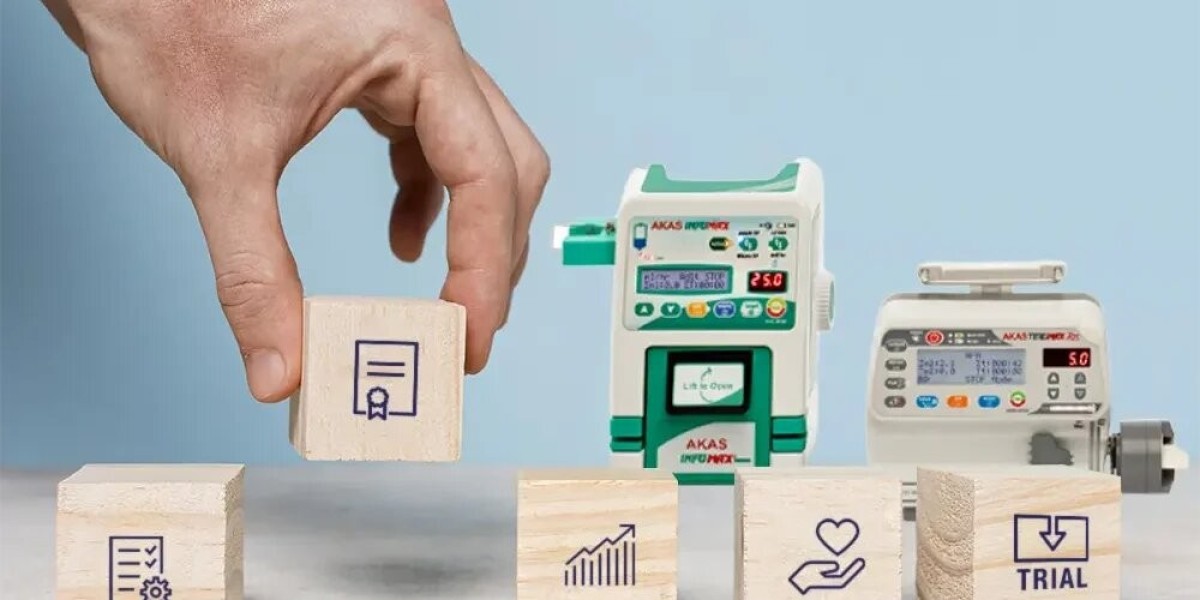Introduction
In modern healthcare, the infusion pump is a vital tool used to deliver fluids, medications, and nutrients to patients with precision and care. With hospitals and medical institutions demanding reliability and safety in drug delivery, understanding the key components of a high-performance infusion pump system is essential. These pumps are designed to enhance the quality of patient care by ensuring accurate medication delivery while minimising the risk of errors.
For medical institutions, selecting the right infusion pump is crucial for maintaining the highest standards of care. Below, we explore the essential components of a high-performance infusion pump and why each plays a critical role in patient safety.
Key Components of a High-Performance Infusion Pump System
Pump Mechanism
The core function of any infusion pump system lies in its pump mechanism. This component controls the delivery of fluids and medications at accurate rates.
High-performance infusion pumps use advanced mechanical systems that can handle varying fluid viscosities and provide consistent delivery over long periods.
The pump mechanism’s precision is paramount in preventing over or under-infusion, which could lead to harmful patient outcomes.
Flow Rate Control
A reliable infusion pump must offer precise flow rate control to deliver medications at the prescribed speed.
High-quality systems allow healthcare professionals to set rates ranging from a slow drip to a rapid infusion, depending on the patient's needs.
Adjustable flow rates ensure that patients receive the correct amount of medication in accordance with their treatment plan, especially in critical care settings.
Infusion Accuracy
Infusion accuracy is a crucial aspect of infusion pump systems. Infusion pumps are engineered to deliver precise volumes of fluid without fluctuations.
These systems feature sensors that continuously monitor the infusion process, detecting any deviation from the set parameters.
Accuracy is critical, particularly for medications with narrow therapeutic windows or in cases where small adjustments can make a significant difference in patient safety.
Alarms and Alerts System
Infusion pumps are equipped with alarms to warn healthcare professionals if an issue arises during the infusion process.
These alarms may indicate conditions such as occlusions, air in the line, or low battery, alerting caregivers to potential risks.
The presence of clear and audible alarms is a key feature that adds a layer of safety and helps prevent adverse events in high-risk patient care environments.
User Interface
A high-performance infusion pump features an intuitive and easy-to-use interface. Healthcare providers rely on this for efficient operation.
The display typically shows vital information such as infusion rate, total volume, and time remaining. User-friendly systems reduce the chances of errors caused by complicated interfaces.
With touchscreen interfaces and clearly labelled buttons, modern infusion pumps allow quick adjustments, even in busy hospital settings.
Infusion Accuracy Monitoring
Continuous monitoring of infusion accuracy is essential for high-performance infusion pumps. This feature tracks the volume delivered in real-time, ensuring that the pump operates within the specified parameters.
In some advanced systems, the accuracy of the pump is regularly calibrated automatically to maintain optimal performance.
This ongoing monitoring capability is particularly crucial in critical care and oncology settings where the precise dosing of medication is vital to patient recovery.
Battery Life and Power Supply
The power system of an infusion pump is critical, especially in emergency or mobile care situations where power sources might be limited.
High-performance infusion pumps come equipped with long-lasting rechargeable batteries that can operate for hours without needing a power source.
Reliable power ensures that the infusion pump remains operational in various hospital settings, from intensive care units (ICUs) to emergency rooms.
Additional Features of High-Performance Infusion Pumps
Multitasking Ability: Modern infusion pumps can often manage multiple infusions simultaneously, catering to complex patient needs.
Data Logging and Integration: Many advanced infusion pumps log data that can be integrated with hospital information systems (HIS) or electronic health records (EHR) for enhanced patient monitoring.
Safety Features: These pumps include mechanisms to detect issues such as air bubbles, kinks in the tubing, or incorrect infusion parameters.
Choosing the Right Infusion Pump for Your Hospital
When selecting an infusion pump for your medical institution, several factors should guide your decision. Ensure that the pump aligns with your hospital’s needs and provides the level of performance required in critical care environments. Here are some considerations:
Compatibility: The infusion pump should be compatible with the medications and treatments commonly used in your hospital.
Ease of Use: A user-friendly interface that simplifies operation is essential for reducing human error.
Reliability: High-quality pumps should have a proven track record for reliable, long-term use without frequent malfunctions.
Safety Features: Look for pumps with built-in safety features such as alarms and continuous monitoring to prevent medication errors.
Conclusion
Understanding the key components of a high-performance infusion pump system is vital for healthcare providers who aim to deliver optimal care to their patients. From flow rate control and infusion accuracy to user interfaces and alarms, each component plays a significant role in enhancing patient safety and care quality.
As a world-class manufacturer of drug delivery devices, Akas Infusion is committed to producing high-quality volumetric pumps and other infusion pump systems. Akasinfusion’s products are designed to support healthcare institutions in providing safe, accurate, and reliable treatment for patients worldwide. Choosing the right infusion pump supplier ensures that your institution can meet the highest standards of patient care, with the best technology available at your fingertips.








